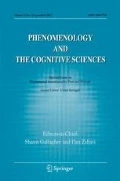Notes
Lear appeals to Wittgenstein’s later work, particularly the rule-following considerations of Philosophical Investigations (Wittgenstein 1953).
In his chapter, A.W. Moore offers reasons for why we should adopt the second of these two attitudes (Moore 2011).
The argument thus has the form of a transcendental argument. I discuss this issue, as the second major theme of the collection, in more detail below.
“If we were not conscious that what we think is the same as what we thought a moment before, all reproduction in the series of representations would be useless.” (Kant 1781/7:A103)
Kornblith appeals to Skinner and Ferster’s studies of rats and pigeons (Skinner and Ferster 1957), and states that much of the empirical literature regarding animal mechanisms of learning contradicts the anti-naturalist’s inference.
References
Brandom, R. (1994). Making it explicit: Reasoning, representing and discursive commitment. Cambridge: Harvard University Press.
Brandom, R. (2000). Articulating reasons: An introduction to inferentialism. Cambridge: Harvard University Press.
Davidson, D. (1974). On the very idea of a conceptual scheme. Proceedings and Addresses of the American Philosophical Association, 47, 5–20. Reprinted in his Inquiries into Truth and Interpretation, (pp. 183–98). Oxford: Clarendon Press, 2001.
Haddock, A. (2011). Davidson and idealism. In J. Smith & P. Sullivan (Eds.), Transcendental philosophy and naturalism (pp. 26–41). Oxford: Oxford University Press.
Kant, I. (1781/7). Critique of pure reason. Translated by N. Kemp Smith. London: Macmillan Press, 1929
Kitcher, P. (2011). The Unity of Kant’s Active Thinker. In J. Smith & P. Sullivan (Eds.), Transcendental philosophy and naturalism (pp. 55–73). Oxford: Oxford University Press.
Kornblith, H. (2011). Reasons, naturalism, and transcendental philosophy. In J. Smith & P. Sullivan (Eds.), Transcendental philosophy and naturalism (pp. 96–119). Oxford: Oxford University Press.
Lear, J. (1982). Leaving the world alone. Journal of Philosophy, 79, 382–403.
Maddy, P. (2011). Naturalism, transcendentalism, and therapy. In J. Smith & P. Sullivan (Eds.), Transcendental philosophy and naturalism (pp. 120–156). Oxford: Oxford University Press.
McDowell, J. (1996). Mind and world, with a new introduction by the author. Cambridge: Harvard University Press.
Moore, A. W. (2011). Vats, sets, and tits. In J. Smith & P. Sullivan (Eds.), Transcendental philosophy and naturalism (pp. 41–54). Oxford: Oxford University Press.
Skinner, B. F., & Ferster, C. (1957). Schedules of reinforcement. New York: Appleton Century Crofts.
Smith, J. (2011). Strawson on other minds. In J. Smith & P. Sullivan (Eds.), Transcendental philosophy and naturalism (pp. 184–208). Oxford: Oxford University Press.
Smith, J., & Sullivan, P. (2011). Introduction: Transcendental philosophy and naturalism. In J. Smith & P. Sullivan (Eds.), Transcendental philosophy and naturalism (pp. 1–25). Oxford: Oxford University Press.
Stern, R. (2011). The value of humanity: Reflections on Korsgaard’s transcendental argument. In J. Smith & P. Sullivan (Eds.), Transcendental philosophy and naturalism (pp. 74–95). Oxford: Oxford University Press.
Strawson, P. F. (1959). Individuals: An essay in descriptive metaphysics. London: Routledge.
Stroud, B. (1968). Transcendental arguments. Journal of Philosophy, 65, 241–256.
Sullivan, P. (2011). Is logic transcendental? In J. Smith & P. Sullivan (Eds.), Transcendental philosophy and naturalism (pp. 157–183). Oxford: Oxford University Press.
Wittgenstein, L. (1953), Philosophical Investigations. Translated by G.E.M. Anscombe. London: Blackwell
Author information
Authors and Affiliations
Corresponding author
Rights and permissions
About this article
Cite this article
Shaw, D. Review of Transcendental Philosophy and Naturalism . Phenom Cogn Sci 11, 423–430 (2012). https://doi.org/10.1007/s11097-012-9255-1
Published:
Issue Date:
DOI: https://doi.org/10.1007/s11097-012-9255-1

